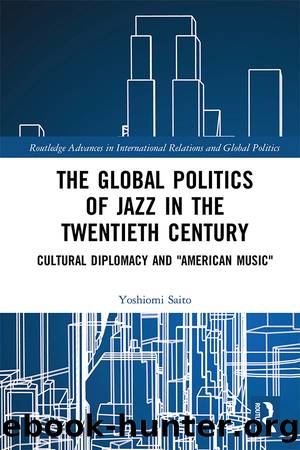The Global Politics of Jazz in the Twentieth Century by Yoshiomi Saito

Author:Yoshiomi Saito [Saito, Yoshiomi]
Language: eng
Format: epub
Tags: Music, History & Criticism, Social Science, Regional Studies
ISBN: 9780429594076
Google: ZcSrDwAAQBAJ
Publisher: Routledge
Published: 2019-08-28T04:58:31+00:00
The 1960s Japanese jazz scene saw the emergence of a new discourse regarding the social standing of the music. This was not irrelevant to the series of changes surrounding the American jazz scene occurring at the same time. Domestic socio-political developments, as exemplified by the radicalization of the student movement in the years leading up 1968, narrowed the distance between Japanâs university student population and jazz. In an era when the university entrance rate was around the 10 percent range, students were seen as elites, but some of them projected themselves as part of the repressed, thereby associating themselves with the ideology of Black Power, while also appealing for solidarity with the Third World.37
Around this time, Amiri Barakaâs Blues People became globally acclaimed. In France, students as well as intellectuals raised their abstract expectations to Maoism while listening to free jazz. Philosophical jazz criticisms based on the thoughts of Roland Barthes, Jacques Derrida, Michel Foucault, Pierre Bourdieu, Louis Althusser and others spread widely, and the social position of jazz was frequently discussed in these circles. A typical example was one criticâs article âLe Nouveau jazz et la réalité américaineâ â detailing the civil rights movement â interpreting the free-jazz aesthetics and the riot in Watts, Los Angeles in 1965, through a reading of Frantz Fanonâs The Wretched of the Earth, a seminal work in postcolonial criticism.38
Although the jazz scenes of France and Japan had not been exactly the same, they became closer once Japanese fans and critics started to pay attention to the social condition of African Americans in American society. Still, unlike France where its declining global standing and paucity of influence in global affairs overlapped with the poor social standing of African Americans, many jazz discourses in Japan stressed the need for promoting ties between the Japanese and âcolored people,â as it was believed they had both been at one point ruled by white people. These criticisms were influenced by the ongoing conflict in Vietnam and the decolonization process in Africa.39 âBlacknessâ in Japanese jazz discourse was conspicuous at the World Jazz Festival held at Tokyo, Osaka, Kyoto, Nagoya and Sapporo in 1964. Many stars, including Miles Davis, Wynton Kelly, J. J. Johnson, Clark Terry, Gene Krupa, Paul Chambers, Red Nichols, Sonny Stitt and Carmen McRae, participated in this festival, appearing alongside Japanese jazz musicians such as Toshiko Akiyoshi, Hidehiko Matsumoto, and Nobuo Hara and His Sharps & Flats. In a panel discussion with Leonard Feather, who once had caused a controversy in Down Beat by carrying out the so-called blindfold test to insist that race had no basis in determining the quality of a jazz performance, Feather denied racial factors existed in jazz based on his long-held conviction of color-blindness. This highlighted a key difference with the Japanese panelists he was appearing with, who believed that jazz and race were indivisible.40
Download
This site does not store any files on its server. We only index and link to content provided by other sites. Please contact the content providers to delete copyright contents if any and email us, we'll remove relevant links or contents immediately.
Phoenicians among Others: Why Migrants Mattered in the Ancient Mediterranean by Denise Demetriou(608)
american english file 1 student book 3rd edition by Unknown(608)
Verus Israel: Study of the Relations Between Christians and Jews in the Roman Empire, AD 135-425 by Marcel Simon(593)
Caesar Rules: The Emperor in the Changing Roman World (c. 50 BC â AD 565) by Olivier Hekster(580)
Basic japanese A grammar and workbook by Unknown(575)
Europe, Strategy and Armed Forces by Sven Biscop Jo Coelmont(520)
Give Me Liberty, Seventh Edition by Foner Eric & DuVal Kathleen & McGirr Lisa(497)
Banned in the U.S.A. : A Reference Guide to Book Censorship in Schools and Public Libraries by Herbert N. Foerstel(492)
The Roman World 44 BC-AD 180 by Martin Goodman(478)
Reading Colonial Japan by Mason Michele;Lee Helen;(469)
DS001-THE MAN OF BRONZE by J.R.A(462)
The Dangerous Life and Ideas of Diogenes the Cynic by Jean-Manuel Roubineau(456)
Introducing Christian Ethics by Samuel Wells and Ben Quash with Rebekah Eklund(456)
Imperial Rome AD 193 - 284 by Ando Clifford(454)
The Oxford History of World War II by Richard Overy(454)
Catiline by Henrik Ibsen--Delphi Classics (Illustrated) by Henrik Ibsen(427)
Language Hacking Mandarin by Benny Lewis & Dr. Licheng Gu(411)
Literary Mathematics by Michael Gavin;(407)
Brand by Henrik Ibsen--Delphi Classics (Illustrated) by Henrik Ibsen(390)
